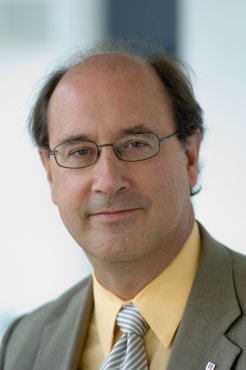Professor Bernard Schutz elected Fellow of the Royal Society
The founding director of the Max Planck Institute for Gravitational Physics is honored for his seminal contributions to relativistic astrophysics
The Royal Society has elected Bernard F. Schutz, former director at and founding director of the Max Planck Institute for Gravitational Physics as a Fellow. Every year, a maximum of only 52 fellows may be elected to the UK’s national science academy. Fellows are elected for life through a peer review process on the basis of their excellence in science.
“Being elected a Fellow of this historic academy is a great honor for me,” says Bernard Schutz, founding director of the Max Planck Institute for Gravitational Physics (Albert Einstein Institute) and professor at Cardiff University. “I’m really delighted to receive such a wonderful recognition of my research and I am very aware of how much I owe to all my collaborators in our amazing research field.”
Schutz’s work in the 1980s laid the foundations for interpreting the data that the big detectors like LIGO and Virgo (then just proposals on the drawing board) would gather 30 years later. He showed how to use gravitational waves to measure distances across the Universe, and how to go from that to measuring the expansion rate of the Universe, one of the most fundamental numbers in all astronomy. He then showed how to extract the very weak expected signals from the data, developing methods used to this day. This work continued when Schutz came to Potsdam, where his department brought into the field a good fraction of the data analysts and supercomputer simulation specialists working in the gravitational-wave science today.

Bernard Schutz studied physics at Clarkson University, New York, USA, and obtained his PhD in 1972 at the California Institute of Technology. After 21 years at Cardiff University, Wales, UK as Lecturer and Reader and Professor for Physics and Astronomy he became one of the founding directors of the Max Planck Institute for Gravitational Physics (Albert Einstein Institute) in Potsdam in 1994. As director of the Astrophysical Relativity department he played a major role in building up the institute until his retirement in 2014. Currently he is professor in Physics and Astronomy at Cardiff University.
Schutz has developed important principles for the observation of the universe with gravitational waves, leading to their direct detection in 2015. For his contributions to gravitational physics, Schutz was awarded several prizes, including the 2006 Amaldi Medal by the Italian Society of General Relativity and Gravitation, the 2019 Eddington Medal of the Royal Astronomical Society and the 2020 Richard A. Isaacson Award in Gravitational-Wave Science by the American Physical Society. In 2011, he received an honorary Doctorate of Science from the University of Glasgow. Bernard Schutz has been elected a member of the US National Academy of Sciences, the German National Academy of Sciences Leopoldina, the Learned Society of Wales, and the Royal Academy of Arts and Sciences, Uppsala.
The origins of the Royal Society lie in an association of natural philosophers and physicians founded in 1660. Today, the Royal Society is the UK’s national science academy and a Fellowship of some 1,600 world-renowned scientists. Fellows are selected based on having made “a substantial contribution to the improvement of natural knowledge, including mathematics, engineering science and medical science”. They are elected for life through a peer review process.
The Society’s fundamental purpose is to recognise, promote, and support excellence in science and to encourage the development and use of science for the benefit of humanity.










